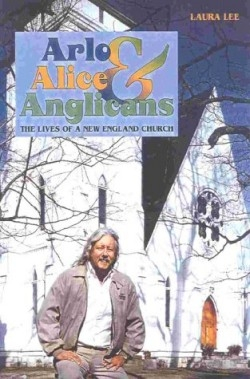Arlo, Alice, and Anglicans
The Lives of a New England Church
“You can get…anything you want…at Alice’s Restaurant.” Those coming of age in the late 1960s probably remember folksinger Arlo Guthrie’s eighteen-minute tune relating his Thanksgiving 1965 arrest for littering in a small western Massachusetts town and subsequent appearance before the draft board. The song was made into a film by the same name four years later, earning a best director nomination for Arthur Penn.
Lee details the history of the church, which was central to the movie. It’s where Ray and Alice Brock, Guthrie’s former teachers, lived. The book can be divided into three sections. The first provides historical context for Trinity Church itself-its early roots, the community it served, the eventual dwindling of parishioners, and finally, the decision to deconsecrate the church and sell it.
The purchase of the building by the Brocks in 1963 begins the middle section. The couple started renovating and soon their “home” was always open to former students, such as Guthrie, son of Woody, known for writing “This Land Is Your Land.” The littering episode was the impetus for a tune the younger Guthrie just couldn’t make go away. “I wrote the song as a lark, really.” The popularity of the song led to the movie, which was filmed in and around the church. Lee gives a behind-the-scenes look at what this event was like for the various participants.
The last third of the book deals with what has happened to the church in the last thirty years. It went through many well-meaning owners, some aware of the building’s status as a cultural landmark, some not. Ten years ago, Guthrie returned to the site to film a piece for a Boston television show. “I didn’t want to buy the church, I had to buy it,” he recalls. He moved his record company, Rising Son Records, and also set up two not-for-profit organizations, The Guthrie Center and The Guthrie Foundation to “further his ideals of social action and helping the community.” The record company recently moved to another location, but the author believes the former Trinity Church has served its basic function throughout many colorful reincarnations.
In a touch of irony, the publishers chose a November release date for the book. It marks the thirty-fifth anniversary of Guthrie’s brush with the law and William J. Obanhein, a.k.a. “Officer Obie.”
Reviewed by
Robin Farrell Edmunds
Disclosure: This article is not an endorsement, but a review. The publisher of this book provided free copies of the book to have their book reviewed by a professional reviewer. No fee was paid by the publisher for this review. Foreword Reviews only recommends books that we love. Foreword Magazine, Inc. is disclosing this in accordance with the Federal Trade Commission’s 16 CFR, Part 255.

